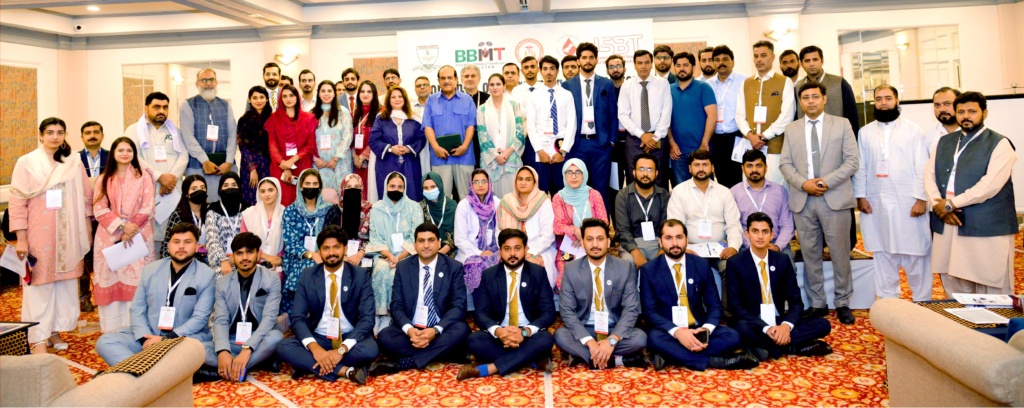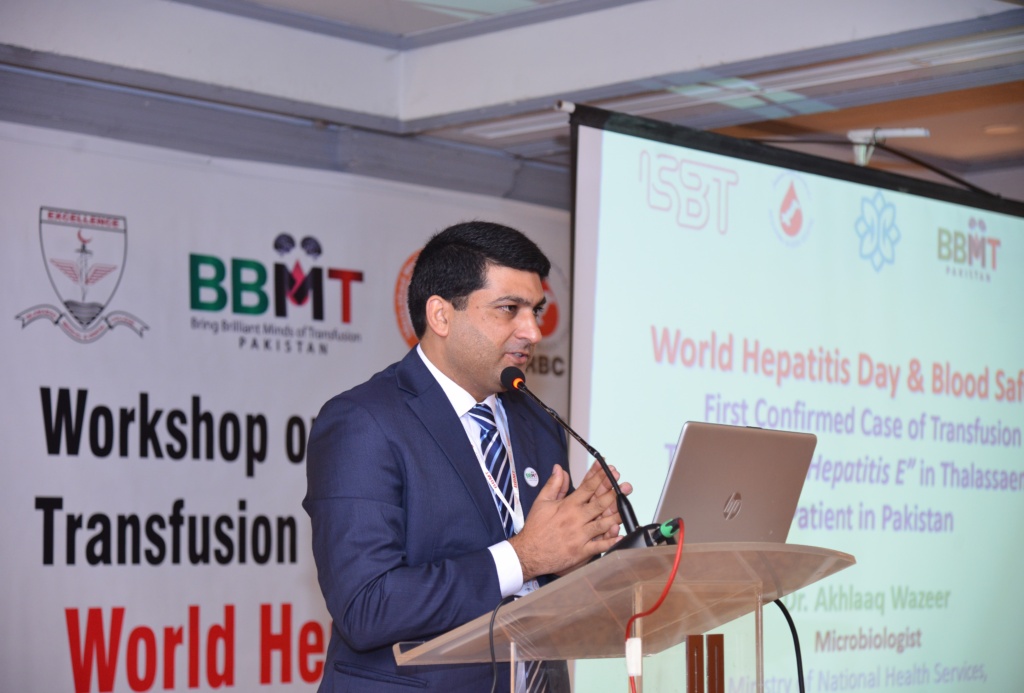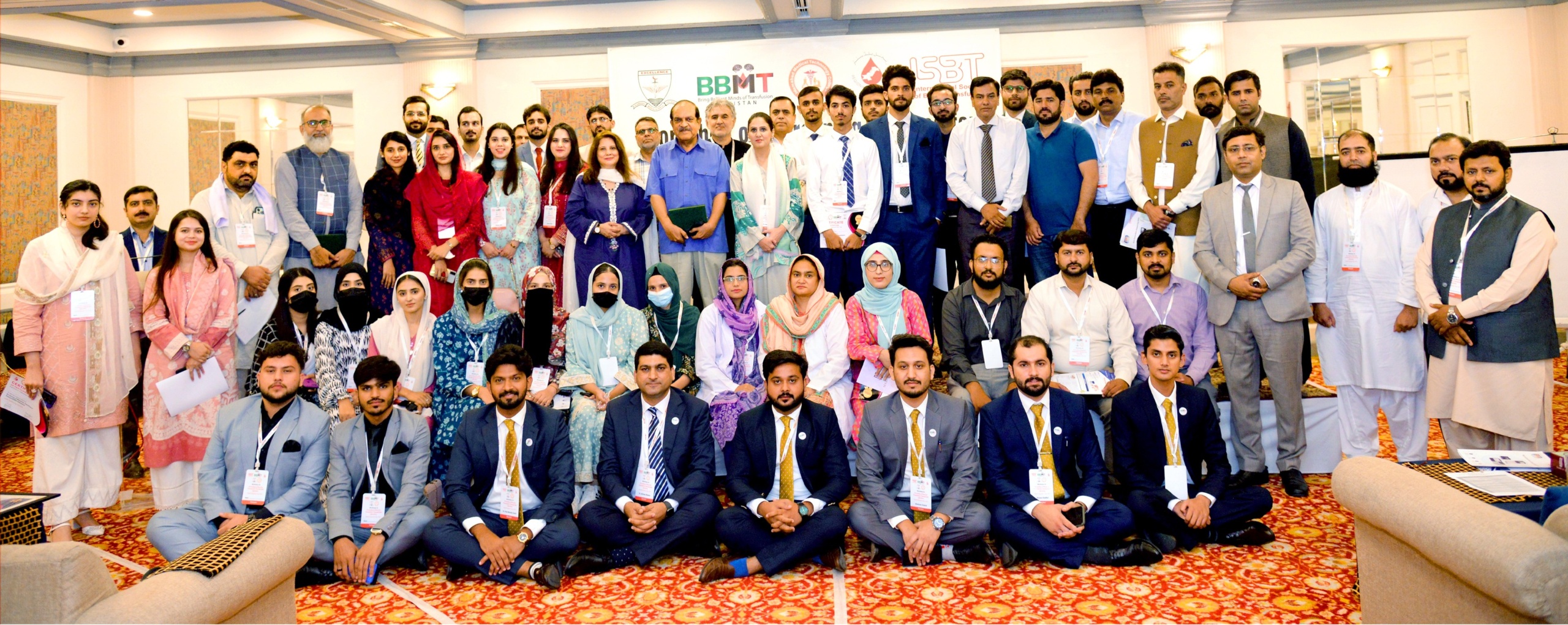
On the occasion of World Hepatitis Day 2025, leading experts in transfusion medicine, virology, and public health gathered in Islamabad for a national seminar titled “Screening of Blood for Transfusion Transmissible Infections (TTIs).” The event was jointly organized by the Islamabad Medical Technology College (IMTC), Regional Blood Centre (RBC) Mirpur, International Society of Blood Transfusion, and BBMT-Pakistan.
The seminar brought together a diverse group of stakeholders, including clinicians, scientists, healthcare regulators, and allied health professionals, to address the critical role of blood safety in preventing hepatitis B, C, and other transfusion-transmitted infections. The seminar was notably attended by representatives of public and private sector blood establishments and pathology laboratories of Islamabad, as well as focal persons from Regional Blood Centres in Mirpur, Hyderabad, Abbottabad, Peshawar, and Quetta, ensuring a broad-based provincial and regional representation.
The proceedings began with a welcome address by Dr. Usman Waheed, Principal, Laboratory Sciences, Islamabad Medical & Dental College, who underscored the urgency of strengthening blood screening protocols to meet global safety benchmarks. He emphasized the importance of this year’s World Hepatitis Day theme in catalyzing policy reforms and public awareness campaigns in Pakistan.
A highlight of the seminar was the presentation by Dr. Akhlaaq Wazeer, Microbiologist, Ministry of National Health Services. He revealed Pakistan’s first confirmed case of transfusion-transmitted hepatitis E in a thalassaemia patient, a development that signals the growing need to expand TTI screening panels. He also pointed out the lack of molecular testing capacity in most public sector blood banks, which hinders early detection of viral pathogens.

The discussion was further enriched by a data-driven presentation by Abuzar Ghaffari, Laboratory Scientist at Alpha Evolution Enterprises, along with Usama Qamar (Dr. AKbar Niazi Teaching Hospital) and Shahnam Shahid (Pakistan Institute of Medical Sciences), who outlined the national prevalence of hepatitis B and C in blood donors and recipients. The findings indicated an alarming level of undiagnosed infections among apparently healthy donors, raising serious concerns about the reliance on rapid screening devices.
Addressing the limitations in local diagnostic capabilities, Dr. M. Rizwan Alam, Associate Professor at Quaid-i-Azam University, shared insights into the indigenous development of molecular screening assays. He called for public-private partnerships and greater investment in research to ensure affordable, sensitive, and locally validated screening tools.
Brig. (Retd.) Prof. Dr. Javaid Usman, Consultant Microbiologist at Army Medical College, delved into the challenges of assay selection in blood banks, stressing the need to balance sensitivity and specificity with logistical feasibility. He urged the adoption of international best practices while tailoring protocols to local epidemiological realities.
In his second presentation, Dr. Usman Waheed discussed donor health and safety in light of recent European Union regulations. He emphasized the need for hemovigilance systems that not only protect recipients but also monitor adverse events in blood donors, such as febrile non-haemolytic reactions.

Dr. Muhammad Fiaz Ch., Chairman of the Advisory Committee at the Allied Health Professionals Council (AHPC), spoke on the growing role of allied health professionals in improving laboratory standards. He advocated for enhanced accreditation processes, continuing education, and regulatory oversight to uplift the profession and ensure quality testing.
On the subject of cognitive and emotional determinants of blood donation behavior, Rabeya Tariq and Jaweria Aftab, Clinical Psychologists, Benazir Bhutto Hospital, Rawalpindi, elaborated that it plays a significant role in shaping blood donation behavior. Cognitive elements, such as knowledge about the life-saving nature and safety of blood donation, impact willingness to donate. Emotional aspects, like empathy, altruism, and social responsibility, motivate individuals to donate, while positive emotions like pride enhance donation intentions. However, emotional barriers, such as fear of pain or negative past experiences, can deter potential donors. Understanding these factors is essential for designing effective campaigns that encourage regular, voluntary blood donations, especially in areas with blood shortages.
The seminar concluded with remarks by Chief Guest Dr. Areej Neyazi, Director, Dr. Akbar Niazi Teaching Hospital. She praised the collaborative efforts of organizers and speakers for spotlighting one of the most pressing public health challenges in Pakistan. She emphasized that combating hepatitis transmission requires synchronized action across the domains of diagnostics, education, and regulation. She assued full support from the platform of IMDC and ANTH to comvATS
Prof. Samina T. Amanat, Clinical Haematologist and Patron-in-Chief of BBMT-Pakistan, delivered the closing remarks, thanking all participants and reinforcing the commitment of the BBMT network to continue advocating for safer blood transfusion practices in the country.

